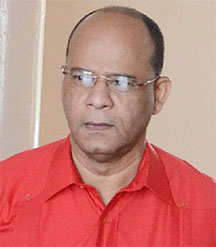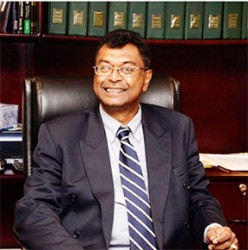Former Minister of Home Affairs Clement Rohee has criticised the new government’s initiative to curb the sale of alcohol after 2AM, saying there is no evidence that suggests the hours of operations of nightspots have any correlation to crime rates.

Rohee lashed out at Public Security Minister Khemraj Ramjattan’s drive to enforce the law that is over 70 years old and stated that without an anti-crime plan, which he said the government does not have, the “curfew” is useless.
“I never did it when I was there, my friend, so why must I do it now? This country is a very opened and relaxed country. There is a certain culture which we share with the Caribbean as Caribbean people and I have never ever noticed during my tenure as Minister of Home Affairs that bars and clubs remaining open after 2 ’o clock led to any spike. There is no scientific data that anyone could provide,” Rohee told reporters during a press conference held at the PPP’s Freedom House headquarters on Robb Street.
Rohee was asked questions in his capacity as the former home affairs minister.
“What you need is not necessarily exclusively an anti-crime plan, because fighting crime is part of violence prevention, so we need to look as the wider dimension,” he said, before adding, “That’s why we always say the police alone cannot fight this social ill.”
According to Rohee, both Ramjattan and President David Granger seemed to have had the solutions during the last Parliament and as a result he expected that when they got into office they would have the blueprints for action.

“But now I’m reading Ramjattan saying he don’t know what to do and I am reading he is saying this thing is so overwhelming. You know, they don’t even have a crime plan? I had asked the former Commissioner of Police for a crime plan. It took a while before he sent one to me,” he said.
‘Not Guyanese’
Citing his own personal experiences from attending weddings and staff parties, Rohee said persons would begin to leave at around 11PM. “People would start walking away and when you ask them where they’re going, they going to Galaxy [Gravity], they’re going to Palm Court, they going to 704; this is after 12 ’o clock. So, what you’re giving these people two hours to sport? Oh come on! This is not Guyanese. And that is the reason why I didn’t do it because I always felt as a Guyanese we live in a relaxed society,” he said, before adding that what the government was essentially resorting to was “imposing a curfew on people.”
Rohee noted that the curfew will do little to impact crime because violence needs to be treated holistically, with all ministries, government agencies and departments being actively involved in policy development.
Last month, the Guyana Police Force reported a 10% increase in serious crimes for the first five months of the year when compared with the same period in 2014.
Ahead of the enforcement of the restriction last weekend, Ramjattan had made it clear that in spite of pleas from several bar and restaurant owners, he would not be backing down and he informed that violators would be dealt with. “We must go ahead with that because drinking has a direct relationship to domestic violence…,” he had said.
He had stated that the Intoxicating Liquor Licences Act and the Licensed Premises Act stipulates a 2AM closure for restaurants and bars.
The Minister also noted that those drinking around that time are also going on heavy binges, “spending monies that could have normally been spent more wisely.” He added that this sort of behaviour has a direct effect on the number of traffic offences being committed as well as work ethic because when persons drink too late, they “can’t get up to go to work and even if you do get up to go to work, you are not working as efficiently as you ought to.” He said that drinking at that hour had a direct impact on the economy.
There has been heavy pushback on the enforcement of the curfew ever since Ramjattan first floated the idea during his presentation at the National Assembly on June 26th. Critics had brushed the idea off until last Saturday when Ramjattan made it pellucid that the enforcement would be done with the assistance of a heavy police presence outside of various night-time hotspots.





